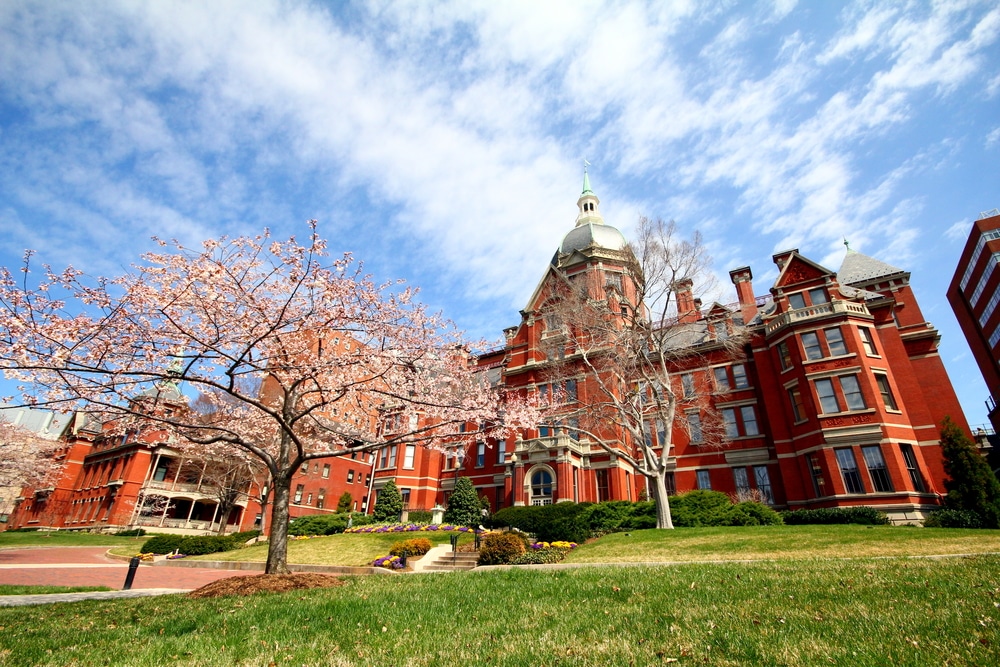Enhancing Your Social Life at Johns Hopkins University
Starting university can feel overwhelming. It is a dramatic shift in lifestyle—full of new faces, unfamiliar surroundings, and countless opportunities for learning and growth. At the esteemed Johns Hopkins University (JHU), the high academic standards and rigorous coursework can make developing a robust social life seem intimidating. However, there are numerous ways to enrich your time at JHU, making it both academically fulfilling and socially rewarding.
Understanding the Social Scene at Johns Hopkins University
JHU boasts a vibrant and diverse social scene that offers students a range of opportunities for interaction, engagement, and connection.
Johns Hopkins University’s social scene is not just about parties and social events. It goes beyond that, encompassing a rich tapestry of experiences that shape students’ lives. When students step on campus, they are greeted with a sense of community and belonging. The university’s commitment to fostering a welcoming environment is evident in the deep-rooted traditions and celebratory spirit that permeate campus life.
One of the defining features of the social scene at JHU is the inclusivity it promotes. Regardless of their backgrounds or academic fields, all students are encouraged to participate and contribute to the vibrant tapestry of campus culture. This sense of inclusivity creates an environment where everyone can feel welcome, connected, and engaged.
But the social scene at JHU is not just about having a good time. It is also a place where intellectual curiosity thrives. The university’s emphasis on academic excellence extends beyond the classroom, creating opportunities for students to engage in insightful discussions and exchange ideas. These interactions often lead to deep friendships and powerful networking connections that last a lifetime.
The Role of Campus Culture in Social Life
Campus culture plays a significant role in shaping the social dynamics at JHU. It is characterized by a sense of community, deep-rooted traditions, and a celebratory spirit that invites participation from all students, regardless of their backgrounds or academic fields. This culture fosters an environment where everyone can feel welcome, connected, and engaged.
One of the hallmarks of JHU’s campus culture is its commitment to diversity and inclusion. The university recognizes the importance of embracing different perspectives and experiences reflected in the social scene. Students from all walks of life celebrate their differences and learn from one another.
Moreover, the culture at JHU fosters intellectual curiosity and a collective passion for learning that extends beyond the classroom. Students often engage in insightful discussions and exchange ideas, leading to deep friendships and powerful networking connections.
Whether attending cultural events, participating in student organizations, or simply engaging in conversations with peers, the campus culture at JHU provides countless opportunities for students to connect and form meaningful relationships.
The Influence of Academics on Social Interactions
As a renowned research university, academics at JHU play a significant role in students’ social interactions. The intensity and rigor of coursework create opportunities for students to collaborate, problem-solve, and develop a sense of camaraderie.
In the classroom, students often work together on group projects, engage in lively debates, and challenge each other’s ideas. These academic interactions enhance the learning experience and foster a sense of community and collaboration.
Moreover, the classroom is just the beginning. Academic endeavors lead to opportunities for collaborative research, international internships, and participation in academic clubs and organizations, all of which broaden the social networks of JHU students. These extracurricular activities allow students to connect with like-minded individuals who share their academic interests and passions.
Whether conducting groundbreaking research alongside faculty members or representing JHU at international conferences, students at JHU are constantly expanding their horizons and forging connections that extend far beyond the boundaries of the campus.
In conclusion, the social scene at Johns Hopkins University is a vibrant and dynamic tapestry of experiences that encompasses more than just parties and social events. It is a place where students come together to celebrate their differences, engage in intellectual discussions, and form lifelong friendships. The campus culture and academic pursuits intertwine to create a unique social environment that fosters inclusivity, collaboration, and personal growth.
Strategies for Socializing at Johns Hopkins University
Students at JHU have myriad options for social engagement. Finding the right fit can feel like an adventure in itself. Whether you’re an incoming freshman or a transfer student, exploring various avenues to maximize your time at university is essential.
Joining Student Organizations and Clubs
One of the most straightforward ways to meet like-minded peers is through student organizations and clubs. Johns Hopkins University boasts many clubs and organizations catering to diverse interests and passions. Whether you’re interested in dance, debate, or data science, chances are there’s a club for you.
Participating in such organizations is about sharing interests and learning from others, becoming part of a supportive community, and developing leadership skills. By joining a club, you can engage in activities that align with your passions and connect with individuals who share your enthusiasm. It can also provide a sense of belonging, essential for a fulfilling social experience in university.
For example, suppose you have a passion for environmental sustainability. In that case, you can join the “Green Earth Society” and collaborate with fellow students to organize events and initiatives that promote eco-friendly practices on campus. Through these activities, you can not only make friends but also make a positive impact on the environment.
Participating in Campus Events and Activities
Attending campus events and activities is another excellent way to build a diverse social network. Johns Hopkins University offers a vibrant calendar of events throughout the year, catering to various interests. These events could range from sporting events to art exhibitions, music concerts, guest lectures, and multicultural festivals.
Attending these activities allows you to explore new interests and provides opportunities to bond with fellow students who share similar passions. For example, if you follow a guest lecture by a renowned scientist, you can engage in intellectual discussions with other attendees and forge connections based on shared academic interests.
Active participation in such activities can also boost your confidence, improve your communication skills, and provide a well-rounded university experience. By attending a music concert, for instance, you can appreciate different genres of music, meet fellow music enthusiasts, and even discover potential bandmates if you’re a musician.
Moreover, campus events and activities often showcase the rich cultural diversity present at Johns Hopkins University. By attending multicultural festivals, you can immerse yourself in various traditions, taste different cuisines, and engage in conversations that broaden your perspective on the world.
In conclusion, socializing at Johns Hopkins University is an exciting journey that offers countless opportunities for personal growth and connection. By joining student organizations and clubs and participating in campus events and activities, you can create a fulfilling social experience that complements your academic journey. So, embrace the adventure and make the most of your time at JHU!
Building Meaningful Relationships at Johns Hopkins University
Establishing lasting connections with peers is a hallmark of university life. At JHU, there are plenty of opportunities to form such relationships.
There are various avenues to explore when building meaningful relationships at Johns Hopkins University. The campus offers a vibrant social environment that fosters connections beyond the classroom, from forming study groups and academic partnerships to developing friendships through shared interests.
Forming Study Groups and Academic Partnerships
Forming study groups or academic partnerships can be a great way to break the ice with fellow students. It’s a chance to learn collectively, share insights, help each other through challenges, and create lasting friendships.
Imagine the excitement of gathering with a group of motivated individuals working towards a common academic goal. These partnerships enhance your understanding of the subject matter and provide a support system that extends beyond the classroom walls.
Moreover, study groups and academic partnerships at JHU can prove invaluable regarding research projects, setting up study schedules, or preparing for final exams. Collaborating with like-minded individuals who share your passion for knowledge can lead to a deeper understanding of the material and a sense of camaraderie long after graduation.
Developing Friendships through Shared Interests
Friendships often blossom from shared interests related to academics, hobbies, or other extracurricular activities. Finding others who share your passions can enrich relationships and a vibrant social circle.
At Johns Hopkins University, the campus is teeming with opportunities to connect with individuals who share your interests. Whether you’re into drama, love playing the guitar, or are a genuine fan of ecology, there are clubs, organizations, and events tailored to cater to a wide range of passions.
Imagine joining a theater group and collaborating with fellow students to bring captivating performances to life. Or perhaps you could join a music club and find yourself jamming with talented musicians who share your love for the guitar. The possibilities are endless.
Remember, university life is as much about learning from textbooks as learning from each other. By actively seeking out those who share your interests at JHU, you open yourself up to enriching experiences and the potential for lifelong friendships.
So, whether you’re forming study groups to conquer challenging coursework or seeking out individuals who share your passions, Johns Hopkins University provides the perfect environment to build meaningful relationships. Embrace the opportunities that await you and forge connections that will last a lifetime.
Balancing Academics and Social Life at Johns Hopkins University
Balancing rigorous academics with an active social life can challenge every JHU student. However, it’s not insurmountable.
At Johns Hopkins University, students are known for their dedication to their studies and commitment to making the most of their college experience. With a wide range of academic opportunities and a vibrant social scene, JHU offers students the chance to excel academically while enjoying a fulfilling social life.
One of the critical factors in successfully balancing academics and social life is practical time management. Time management techniques can help you navigate the demands of academics and social life. Creating a balanced schedule, maintaining a consistent routine, prioritizing tasks, and avoiding procrastination are just a few strategies that might help.
But time management is not just about scheduling your academic and social activities. It’s also about finding the right balance between the two. It’s about recognizing that while academics are important, so is having a social life. It’s about understanding that socializing and building connections with peers can enhance your college experience and contribute to your personal growth.
Getting organized and staying on top of your tasks enhances productivity, reduces stress, and leaves more time for socializing and self-care. By visiting organized, you can ensure you have enough time to study, attend classes, and complete assignments while carving out time for social activities and relaxation.
However, it’s important to note that balancing academics and social life also requires taking care of yourself. While socializing and scholars are essential, so is taking care of your physical and mental well-being. Regular exercise, getting enough sleep, healthy eating, and setting aside time for relaxation and hobbies are essential.
Remember, it’s okay to take breaks and recharge. Taking care of your physical and mental well-being makes you more resilient and helps you maintain a positive outlook on your university journey. It allows you to approach your academic and social commitments with a clear and focused mind.
At Johns Hopkins University, numerous resources are available to support students in their quest for balance. The university offers counseling services, wellness programs, and fitness facilities to help students prioritize self-care. Additionally, various student organizations and clubs cater to a wide range of interests, providing opportunities for socializing and pursuing hobbies.
In conclusion, balancing academics and social life at Johns Hopkins University is a challenge every student faces. However, with effective time management, self-care, and a supportive university community, it is possible to strike a balance that allows for both academic success and a fulfilling social life. So, embrace the challenge, make use of the resources available, and enjoy the journey of balancing academics and social life at JHU.
Navigating Challenges in Your Social Life at Johns Hopkins University
Making connections and building a social network isn’t always smooth sailing. There might be challenges along the way, but remember that it’s part of the process, and support’s always available.
Dealing with Social Anxiety and Stress
Feelings of social anxiety and stress are common in university life. Feeling unsure about fitting in, making connections, or juggling academics with social commitments is perfectly natural.
The good news is that JHU offers various resources to help students cope, including counseling and psychological services, academic support services, and numerous wellness initiatives. Don’t hesitate to seek help if the pressure feels overwhelming—remember, you’re not alone.
Overcoming Obstacles in Building Social Connections
Building social connections can sometimes be complex and challenging. There might be setbacks, misunderstandings, and perhaps even conflicts. But don’t let these deter you from seeking meaningful relationships.
Overcoming such obstacles forms part of the university learning experience, contributing to personal growth and resilience. Remember that each new encounter, whether successful or challenging, brings its share of valuable life lessons.
As you navigate your social life at Johns Hopkins University, remember that every interaction and experience helps you grow and shapes your university journey. The challenges, triumphs, and friendships all add up to a rich, memorable, and invaluable experience. So, step out of your comfort zone, embrace the opportunities, and maximize your time at JHU.
If you want to discuss the matter to a greater extent or inquire about college admissions, look no further! Our experts here at AdmissionSight can help you! Here at AdmissionSight, we have over a decade’s worth of experience guiding students through the competitive admissions process to get accepted to the top universities in the world. Feel free to set up an appointment today to book your initial consultation.









































